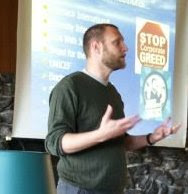Loss and Gain
Whatever gains I have made in the world, because of Jesus I consider them rather a loss--not only rubbish and worthless, but actually counting against me, listed in the 'minus' column of my spiritual balance-sheet.
Why should worldly success be counted so adversely to a transformative relationship with Christ? Can't we have a relationship with Christ and be successful in the world? For Paul, it seems, the answer is no. I wonder if he was reading the Gospel of Luke at the time.
Paul seems right in line with Luke on this point. One of the overriding themes of Luke is the danger of material (worldly) success: wealth, power, prestige, praise, and so on. More than the other Gospels, Luke castigates wealth and the stranglehold material possessions have on people's hearts--and he's right, of course, our wealth does hold us back from being the kind of disciples Jesus calls us to be. (We are all that rich ruler who asks in all sincerity what we must do to gain eternal life, but then shirk from Jesus' frank reply: give up all your wealth and comforts and follow me.) Paul, too, picks up on this radical demand of Jesus, and seeing how difficult it is to do, Paul counts all those things holding him back to a worldly sense of accomplishment and merit, success and comfort, power and praise... Paul holds all of them as a loss, as something that holds him back, something that holds him down or slows his reaction to the gospel, that prevents a true discipleship.
Here, Paul is wrestling with the same realization--that this is really tough, and most people won't be able to do it very well--the same realization that Matthew faced in his Gospel when the rich ruler confronted Jesus. Matthew's answer was that one could be a disciple to the degree to which one gave up attachment to possessions. If one would be perfect, he wrote, one would give up all possessions and follow Jesus... opening the door to all of our (eager? inevitable? satisfactory?) 'mediocre' discipleship: we'll give up a little and count that as discipleship, or we'll know that our attachment to possessions is bad and we'll consider that awareness as our discipleship. Matthew opens this door to a softer, more permissive, less demanding discipleship. And Paul wrestles with his own convictions on the one hand, and the likely response of seekers to such a demanding discipleship on the other. Even so, Paul for himself comes down clearly in step with Luke on this issue: confidence in the flesh (or worldly goods) is only a stumbling block to discipleship.
This is a big statement for the Philippians--signaled by the occupation of ten verses on this specific point.
And for me... it is a reminder. I easily jump to the condemnation of wealth and power (even though I enjoy both as a middle-class American in a world dominated by American interests and supporting an high American standard of living). (For all my love of Luke's harshness and clarity of vision, in the end I sneak into discipleship through the back door opened up by Matthew.) Condemnation of wealth and power comes easily to me--I have taken that part of the prophetic message to heart and it is in my blood everywhere just under the surface. What is harder for me is the 'being thought well of' and especially the surety of convictions that I hardly question that are to me stumbling blocks to my transformation. To have such single-minded confidence in ideas or theories is one way the world holds on to my heart. It gives me some impression (however false or inadequate) that I am in control, or that I have some profound understanding of the mechanisms at work. And this is a false impression (as Job so painfully shows us). I am not loosed from the struggle or senselessness of the world, even in my accepting struggle and senselessness as a reality or means of creating meaning and purpose. I have to accept the contingency of my confidence/belief in contingency. What is ultimate for me must not be these convictions about the world--the way it works, the evil of capitalism, the inevitability of war, the horror of alliance with Bush, and so on. What must be ultimate for me is the dedication to the possibility of transformation, new life, new understanding--and the shifts I cannot predict may be subtle or radical, but I have committed myself to them, not knowing what they are.
Discipleship is like baptism or marriage, we dedicate ourselves to something (and someone) not knowing what will happen, the changes we will be called upon to make, the demands we must answer, the roads we will have to go down. But we commit ourselves nonetheless. And that, like any two paths diverging in the woods, makes all the difference.
And our time spent deliberating about which path to go down--one leading to wealth and comfort, the other to suffering and Christ--is counted as loss.
Labels: America, Philippians, Way of the Cross (Discipleship)



0 Comments:
Post a Comment
<< Home